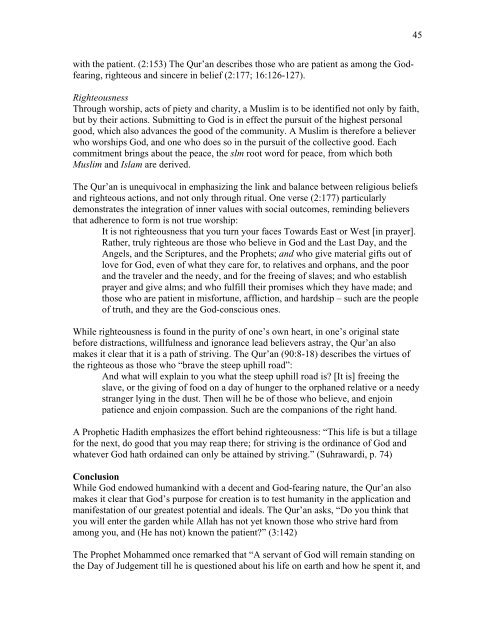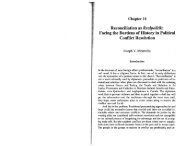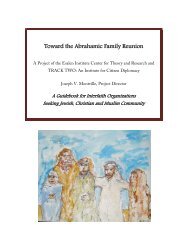The Ethics and Pro-Social Values in Judaism, Christianity and Islam ...
The Ethics and Pro-Social Values in Judaism, Christianity and Islam ...
The Ethics and Pro-Social Values in Judaism, Christianity and Islam ...
You also want an ePaper? Increase the reach of your titles
YUMPU automatically turns print PDFs into web optimized ePapers that Google loves.
45<br />
with the patient. (2:153) <strong>The</strong> Qur’an describes those who are patient as among the Godfear<strong>in</strong>g,<br />
righteous <strong>and</strong> s<strong>in</strong>cere <strong>in</strong> belief (2:177; 16:126-127).<br />
Righteousness<br />
Through worship, acts of piety <strong>and</strong> charity, a Muslim is to be identified not only by faith,<br />
but by their actions. Submitt<strong>in</strong>g to God is <strong>in</strong> effect the pursuit of the highest personal<br />
good, which also advances the good of the community. A Muslim is therefore a believer<br />
who worships God, <strong>and</strong> one who does so <strong>in</strong> the pursuit of the collective good. Each<br />
commitment br<strong>in</strong>gs about the peace, the slm root word for peace, from which both<br />
Muslim <strong>and</strong> <strong>Islam</strong> are derived.<br />
<strong>The</strong> Qur’an is unequivocal <strong>in</strong> emphasiz<strong>in</strong>g the l<strong>in</strong>k <strong>and</strong> balance between religious beliefs<br />
<strong>and</strong> righteous actions, <strong>and</strong> not only through ritual. One verse (2:177) particularly<br />
demonstrates the <strong>in</strong>tegration of <strong>in</strong>ner values with social outcomes, rem<strong>in</strong>d<strong>in</strong>g believers<br />
that adherence to form is not true worship:<br />
It is not righteousness that you turn your faces Towards East or West [<strong>in</strong> prayer].<br />
Rather, truly righteous are those who believe <strong>in</strong> God <strong>and</strong> the Last Day, <strong>and</strong> the<br />
Angels, <strong>and</strong> the Scriptures, <strong>and</strong> the <strong>Pro</strong>phets; <strong>and</strong> who give material gifts out of<br />
love for God, even of what they care for, to relatives <strong>and</strong> orphans, <strong>and</strong> the poor<br />
<strong>and</strong> the traveler <strong>and</strong> the needy, <strong>and</strong> for the free<strong>in</strong>g of slaves; <strong>and</strong> who establish<br />
prayer <strong>and</strong> give alms; <strong>and</strong> who fulfill their promises which they have made; <strong>and</strong><br />
those who are patient <strong>in</strong> misfortune, affliction, <strong>and</strong> hardship – such are the people<br />
of truth, <strong>and</strong> they are the God-conscious ones.<br />
While righteousness is found <strong>in</strong> the purity of one’s own heart, <strong>in</strong> one’s orig<strong>in</strong>al state<br />
before distractions, willfulness <strong>and</strong> ignorance lead believers astray, the Qur’an also<br />
makes it clear that it is a path of striv<strong>in</strong>g. <strong>The</strong> Qur’an (90:8-18) describes the virtues of<br />
the righteous as those who “brave the steep uphill road”:<br />
And what will expla<strong>in</strong> to you what the steep uphill road is? [It is] free<strong>in</strong>g the<br />
slave, or the giv<strong>in</strong>g of food on a day of hunger to the orphaned relative or a needy<br />
stranger ly<strong>in</strong>g <strong>in</strong> the dust. <strong>The</strong>n will he be of those who believe, <strong>and</strong> enjo<strong>in</strong><br />
patience <strong>and</strong> enjo<strong>in</strong> compassion. Such are the companions of the right h<strong>and</strong>.<br />
A <strong>Pro</strong>phetic Hadith emphasizes the effort beh<strong>in</strong>d righteousness: “This life is but a tillage<br />
for the next, do good that you may reap there; for striv<strong>in</strong>g is the ord<strong>in</strong>ance of God <strong>and</strong><br />
whatever God hath orda<strong>in</strong>ed can only be atta<strong>in</strong>ed by striv<strong>in</strong>g.” (Suhrawardi, p. 74)<br />
Conclusion<br />
While God endowed humank<strong>in</strong>d with a decent <strong>and</strong> God-fear<strong>in</strong>g nature, the Qur’an also<br />
makes it clear that God’s purpose for creation is to test humanity <strong>in</strong> the application <strong>and</strong><br />
manifestation of our greatest potential <strong>and</strong> ideals. <strong>The</strong> Qur’an asks, “Do you th<strong>in</strong>k that<br />
you will enter the garden while Allah has not yet known those who strive hard from<br />
among you, <strong>and</strong> (He has not) known the patient?” (3:142)<br />
<strong>The</strong> <strong>Pro</strong>phet Mohammed once remarked that “A servant of God will rema<strong>in</strong> st<strong>and</strong><strong>in</strong>g on<br />
the Day of Judgement till he is questioned about his life on earth <strong>and</strong> how he spent it, <strong>and</strong>




